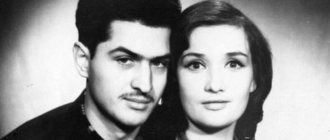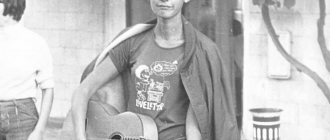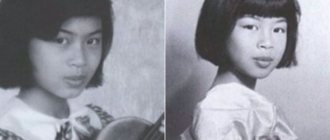All life is theater
But the future artist’s childhood was overshadowed by the war. Together with her mother, Zina went into evacuation and in Cheboksary for the first time felt the attractive power of the stage. Together with her peers, she danced in concerts for wounded Red Army soldiers. The children's efforts did not go unnoticed - Zinaida was awarded the medal "For Valiant Labor." In the future, Zinaida Maksimovna would receive many more awards, titles and prizes, but she considered this medal the most important in her life.
In 1943, Zinaida made an attempt to go to the front, but nothing came of this venture. I had to return to school and continue my studies. Having received her certificate with honors, the girl left her home with a scandal. Her parents were categorically against Zina entering the theater institute . Having collected her things, the girl set her sights on a school at the Moscow Art Theater, but in the end she moved even further north, becoming a student at the Leningrad Theater Institute.
The girl studied well, but the post-war period was not conducive to a luxurious life; at times she had to go hungry, subsisting on sour milk in the student cafeteria. Zina also had hungry fainting spells.
Since her third year, Zinaida Sharko worked in the variety theater at Lenconcert, where she attracted the attention of Georgy Tovstonogov, at that time the head of the Lenin Komsomol Theater. The director invited the talented student to join his troupe , but then changed his mind, which he notified Zinaida by telegram. A little upset, Zinaida Sharko went to serve at the Lensovet Theater with director Nikolai Akimov.
Working in a new place was not easy for Zinaida; the director did not like her method of “growing into” the role; after working with Akimov for two years, Sharko went to the Variety Theater.
The actress joined Tovstonogov at the BDT only in the mid-50s, but already the first theatrical season in this theater brought her five new roles. For many years, Zinaida Sharko “stakes out” roles in productions:
- "Three Sisters";
- "Uncle Vanya";
- "Nobles' Nest"
- "Idiot";
- "King Henry IV";
- "Five Evenings";
- "The Snow Queen";
- "Dachnikov";
- "Departments";
- "Threshold."
Avid theatergoers from all over the country came to watch her mastery of theatrical performances. After Tovstonogov’s death, the actress could not work as before, but she did not leave the theater. Together with Inna Churikova, Zinaida Sharko successfully toured with the “Old Maid” enterprise. The actress sincerely wrote about her creative life in her memoirs “My Personal Data,” which was published in 2014.
1990-2000
Zinaida Sharko also did not part with cinema. Her filmography continued to be replenished with new works. At the beginning of this century, the actress played the role of the elderly cleaning lady Dusya in the TV series “Gangster Petersburg.” In “Mechanical Suite” (2001) she played Plyuganovsky’s mother. This was followed by filming in “Theatrical Romance”. It is impossible not to mention another work of Charcot. We are talking about the film “The Garden Was Full of the Moon” (2000). For the role of Vera Andreevna, she was awarded the prestigious Nika Award.
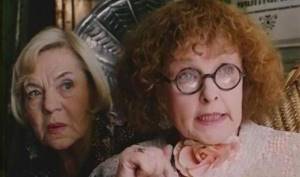
In 2004, director A. Malyukov contacted Zinaida Maksimovna. He offered the actress the main role in his film “Bad Habit.” She really liked the script. But our heroine set one condition for the director - she will not film without Ada Rogovtseva. And Malyukov went to meet her. The acting duet turned out to be amazing. Zinaida successfully got used to the image of Aunt Klava.
Doomed to loneliness
For Zinaida Sharko, work on stage always came first, while family, husband, and children remained in the background. In her youth, the actress was famous for her attractive appearance, but fate confirmed that being born beautiful is not the main thing for family life. Zinaida Maksimovna tried to build a family twice.
From her first marriage to director Igor Vladimirov, she had a son, Ivan, but her husband greatly undermined the woman’s faith in men. He was passionately jealous of his wife, but at the same time he allowed himself to “go wild.” One day Zinaida discovered a notebook in which Igor wrote down the names and professions of his mistresses, and her patience ran out. After the divorce, the actress could not improve her relationship with her son, who took the side of his father in this conflict of interest.

Vladimirov soon married Alisa Freundlich, which became the reason for burning hatred between the two outstanding actresses. Sharko never communicated with her ex-husband again, even despite working together in the theater. The second husband of Zinaida Sharko was actor Sergei Yursky. This marriage lasted seven years, but was also not happy. No children were born in this union. Left alone, Zinaida Maksimovna closed herself off and immersed herself even more in her work.
She enjoyed success with men, took care of herself, accepted attention and courtship, but did not dare to connect her fate with anyone else. Over time, Zinaida Maksimovna established a relationship with her son, but categorically refused to move in with him even in old age, having become accustomed to her loneliness. She never gave up tobacco and hid her cigarettes even after doctors forbade her to smoke.
In the last decades of her life, Charcot reconciled with Freundlich, the actresses even played together in the same play. Zinaida Maksimovna steadfastly fought against cancer and did not complain about her fate.
A documentary film “Zinaida Sharko” was shot about the personal life of the outstanding actress. In proud loneliness".
Personal life
In 1953, the actress married director Igor Vladimirov. They were connected not only by great love, but also by joint work. Sharko performed on the stage of the BDT. And Vladimirov staged performances in which she participated.
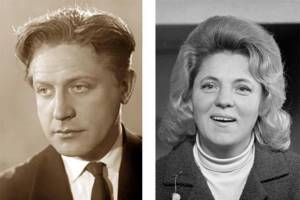
In 1956, the couple had their first child, a tiny son. The boy was named by a common Russian name - Ivan. From an early age, his father and mother instilled in him a love of art.
One day, Igor Vladimirov announced to Zinaida that he had fallen in love with another woman. As a result, he went to actress Alisa Freindlich. Our heroine did not stop or dissuade her husband. At that time, their common son was 7 years old.
Zinaida Sharko was able to survive this betrayal. The artist’s personal life soon improved. She married a second time. Her new chosen one was actor Sergei Yursky. However, this marriage also turned out to be fragile and lasted 7 years.
In recent years, Sharko Zinaida Maksimovna lived alone. Son Ivan often came to visit her with his children. Our heroine spoiled them with fresh pastries and aromatic jam.
Film work
The actress did not act in films as often as she played on stage. There was an opinion that the movie camera did not like Zinaida Sharko. But she has several films in her resume that she can be proud of. In her youth, the actress played herself in the film “Long Farewell ,” embodying the image of translator Evgenia Ustinova. She played so convincingly that her son Vanya, with whom Zinaida Maksimovna did not have a good relationship and who ran away to live with his father, cried at the premiere of the film when he saw her facial expressions and gestures.
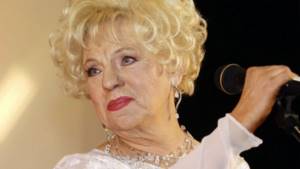
In the legendary film “Dog in the Manger,” Charcot played Anarda, the companion of the main character, and sang the romance. During the Soviet era, the actress starred in such projects as:
- "Other People's Letters";
- "Autumn Story";
- “Fantasy of Faratiev”;
- "The Arithmetic of Murder."
In Russian cinema, the actress was noted for her participation in the films Gangster Petersburg, “Bad Habit”, “Lines of Fate”, “Russian Amazons-2”, “Sonka the Golden Hand”, “Dealer”. But critics consider the most memorable role of Zinaida Sharko in cinema to be the image of Vera Andreevna in the melodrama “The Garden Was Full of the Moon,” released in 2000.
Zinaida Sharko died in 2021. The actress was buried at the Bolsheokhtinsky cemetery in the city on the Neva.
Zinaida Sharko was born on May 14, 1929 in the city of Rostov-on-Don. Even in her youth, she began her creative journey with school amateur performances. Then no one could have imagined that Charcot would become famous. Having graduated from school with honors, she dreamed of a theater institute. And, despite the objections of her parents, she left for Moscow. But, seeing a woman from the admissions committee eating a pickled cucumber in the “temple of art,” young Zinaida changed her mind. Later she realized that she was wrong, but it was this chain of accidents that led her to the Leningrad Theater Institute. Here she came to the famous teacher Boris Zone. He played a big role in the development of Charcot. According to Zinaida Maksimovna, Zon taught them not only theater, but also the art of being people. In 1950, Charcot had the opportunity to collaborate with director Georgy Tovstonogov, but for objective reasons it was postponed until a certain time. Then, in 1952, Zinaida moved to director Nikolai Akimov, who headed the Lensovet Theater. However, this cooperation did not last long. But in 1955, Tovstonogov appeared on the horizon again, inviting Charcot to the Bolshoi Drama Theater. From that moment on, her creative activity began to flourish. Zinaida Sharko received many interesting roles. And starting from the 70s, Charcot got the roles of older heroines. Tovstonogov died in 1989. The golden era of the Bolshoi Drama Theater ended and that is why Charcot was forced to play not only here, but also in other theaters. The most famous roles of Zinaida Maksimovna are Tamara from Five Evenings and Olga in Three Sisters. Well, the first theatrical work was the play “Night of Errors” in 1950. As for film work, Charcot acted much less. Her debut was the film “We Met Somewhere” in 1951. The role was episodic, so Charcot cannot be seen in the credits. A truly serious job was the leading role in the film “The Long Farewell” in 1971. But this film “laid on the shelf” for many years. Charcot was not particularly successful. Many critics explained this by being uncinematic or having too much personality. But in 2000, the painting “The Garden Was Full of the Moon” brought unexpected success to Zinaida Sharko. For this film she even received several awards, in particular “Nika” and “Golden Aries”. But she received the most significant awards as a theater actress. Here it is worth noting the previously mentioned award named after. Stanislavsky, as well as the 1988 Idol Award in the category “Best Actress”. For great services to the theater, Zinaida Sharko was awarded the Order of Friendship and Honor.
Zinaida Sharko married twice, but both times these unions broke up. Zinaida's first husband was Igor Vladimirov, with whom she worked in the same theater. Their marriage lasted 7 years. The second husband of the actress was her stage partner Sergei Yursky. As in the first case, their union could not last more than 7 years. From her first marriage, Zinaida Sharko had a son, Ivan, and now she has grandchildren and even great-grandchildren. Charcot is proud that she did not allow any of her relatives to choose an acting path. “This profession is too ungrateful,” says Zinaida Maksimovna.
Zinaida Sharko: biography
Zinaida Maksimovna Sharko is a recognizable Soviet and Russian theater and film actress who has performed more than a hundred roles in her life. Born near Rostov-on-Don, the daughter of a Cossack woman and a fireman did not imagine that life had in store for her the fate of an artist.
At the age of 12, little Zinochka, as part of the children's ensemble at the Cheboksary House of Pioneers, already participated in concerts for wounded soldiers of the Red Army. Her childhood efforts were rewarded with the medal “For Valiant Labor in the Great Patriotic War.” After many decades, the owner of various awards and titles, Zinaida Maksimovna, still considered the medal “For Valiant Labor...” to be her most important award.

Zinaida Sharko | MetroNews
Zina Sharko first appeared on stage at the age of five. She took part in amateur performances with her father and read the poem “Hedge Gauntlets.” At the age of eight, the talented girl was already playing the role of Cinderella, and a year later she was entrusted with playing the Swan Princess.
In the fourth grade, Zina was involved in the opera play “The Wolf and the Seven Little Goats”; she was entrusted with the role of a goat. That year, the war began, and the ensemble in which the girl was a member began giving concerts in hospitals. In 1943, Zinochka really wanted to go to the front; at that time she was in seventh grade and planned to enter a torpedo school. Her idea was not crowned with success.
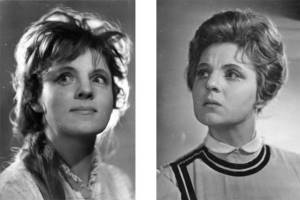
Zinaida Sharko in her youth
After graduating from school with honors, young Zinaida headed to Moscow. She left home with a scandal, since her parents did not support the idea of entering a theater institute. Charcot was aimed at the Moscow Art Theater, but changed her mind. As a result, her choice fell on the Leningrad Theater Institute.
The girl was simply miraculously accepted into the first year; her mentor was the famous theater director Boris Volfovich Zon. It was he who, after 3 years, sent the student to practice at the Leningrad Regional Touring Theater, where the young and talented actress was noticed by director Lydia Atmanaki. It was this acquaintance that later led Sharko to Georgy Tovstonogov.

